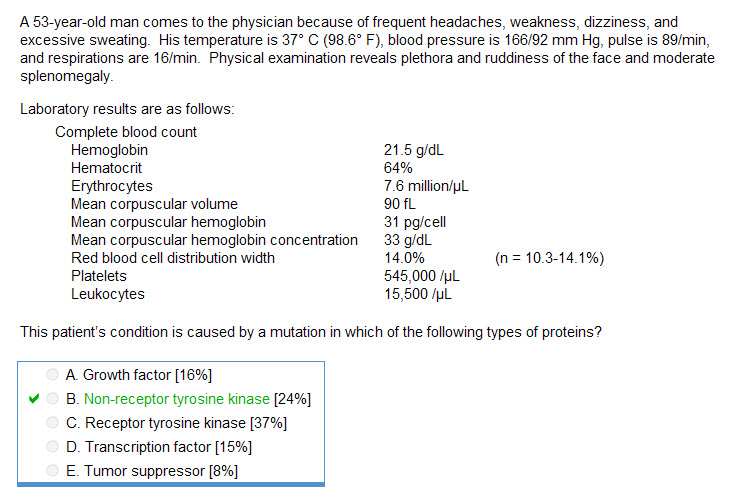In an attempt to displace some of the frustration of studying for boards, I decided to provide an insight into why USMLE STEP 1 is such a difficult exam for medical students – such that, on average, 5-6 weeks need to be dedicated solely to the task of preparation, in addition to the time spent throughout the course of second year. The best way to illustrate the misery of this test is simply to describe the average question that may appear on it. Multiply this by 322, and you have the 7-hour exam that is STEP 1.
To ease the pain ever so slightly, I’ll cast it tn the context of a history question:
In the 20th century, a prominent political figure became heavily involved in the production of a new automobile known as the “People’s Car.” A few years later, this man’s favorite pet, “Blondi”, delivered several offspring. He named one of them “Wolf.” Of what species or breed was “Wolf”? A) Canis lupus
B) Oryctolagus cuniculus
C) Doberman Pinscher
D) Felis catus
E) Golden Retriever
F) German Shepherd
G) Thylacinus Cynocephalus
H) Bradypus variegatus
I) Bloodhound
J) Chihuahua
Now, the first question you may have after attempting to answer this is “What does this have to do with history?” Understandably, trivia is not a favorite pastime for most people. If this is the case, the logical approach might be to try answering one or more of the separate components of this question, hoping that this would lead to the answer. An automobile fan may recognize that “People’s Car” is actually an English translation for Volkswagen, and thus come at the question from this angle – who was behind the success of this company? Sadly, there are no people in the answer choices. “Well,” you say, “I can still get this. After all, I know the genus and species of the Wolf – and Canis Lupus IS an answer choice.” You would be right — and yet ultimately still wrong. Who names their wolf “Wolf”? At this point, you will probably throw up your hands in fury and, rather than continue attempting to answer the question, complain about why it was even asked. Who cares about the pet of a car company owner?
Now, is the purpose of this question really to test your knowledge of cars or famous pets? Of course not. Obviously, the question was testing your understanding of historical leaders, with the simple task of identifying Germany’s leader in the mid 1900s. Because everyone knows that this was Adolf Hitler, it would be silly to have this be an answer choice – no one would get the question wrong, and the bell curve would be all nasty and skewed to the right. Examiners worship the uniformity of the curve like a cult, and do everything in their power to maintain it – even if it means asking the name of Hitler’s pet dog, who happened to be a German Shepard. What, you never learned that? Clearly, you should have studied a couple more weeks.
With the example out of the way, one can begin to identify a structure; a method to the madness:

Anatomy of a board question.
Knowing the structure gives you some idea of what it takes to successfully work through a question, but it is even more useful if we distill this structure into a couple of High-Yield rules:
- The question and answer will rarely be what is explicitly asked.
- The obvious answer is almost always wrong.
- The seemingly logical answer is also generally wrong.
- On a rare occasion, the obvious or logical answer will be right.
Now, the first 3 rules can arguably be explained away as methods to test your critical thinking. Of course, the 4th is there just to play with your mind. Similar to the way your high school biology teacher would have 10 answers in a row be “C” on your multiple choice test, just to troll you. Combine these rules with the multi-step nature of the question, in which you must jump through a series of mental hoops just to figure out what is being asked. Now, add 6-10 answer choices and a time limit. The result: a multiple-choice question in which a failure to successfully complete any one of the steps necessary to answer it results in failure. Guessing doesn’t work out too well, either.
To prove that this isn’t all hyperbole, I actually have a real question to submit as evidence:

A sample USMLE STEP 1 question
I hope you can see the resemblance to my example. Perhaps the detailed analysis and rules actually allowed you to come to the correct answer. Of course, knowing the rules only gets you part of the way there. You still need to know that the Erythropoietin Receptor is a Type I cytokine receptor, meaning that it is associated with a non-receptor tyrosine kinase, and that a JAK2 mutation of this non-receptor tyrosine kinase will lead to a clonal proliferation of hematopoietic stem cells, the disease for which is called Polycythemia Vera. No problem, right? Or at least… nothing a few more weeks of studying First Aid can’t fix.
The problem I have with these questions, is that they’re essentially training us naive young physicians to miss the forest for the trees. You spend so much time memorizing that the creator of the Volkswagen had a German Shepard named Blondi that you forget the fact that this individual was named Adolf Hitler and was responsible for the Second World War. The goal of these so-called “Licensing Exams” has become badly warped. Rather than asking questions that test knowledge a competent physician should have, similar to the way an FAA exam would ask student pilots about proper navigation techniques, the USMLE examiners have somehow decided that the purpose of their test is to stratify medical students into the most symmetric bell curve possible, regardless of the cost. The intent behind many questions is “Let’s try to ask them something they might not know” instead of “Let’s ask something that they should know.” I’m sure this approach makes residency directors happy, as they have a convenient 3-digit number available to sort applicants with, rather than relying on more subjective determinants of ability, such as clinical performance, letters of recommendation, and impressions made during interviews. I suppose I don’t blame them – who in their right mind wants to read 1200 CVs, anyways?

Sampson Greenovich
January 5, 2015 at 9:51 am
Medical help is a great way to keep yourself healthy. I have been planning on getting a physical for years. I don’t know how to go about this though without insurance. Maybe I will figure this out soon though.
http://www.valleymedicalcare.com/clinic-information/about-us